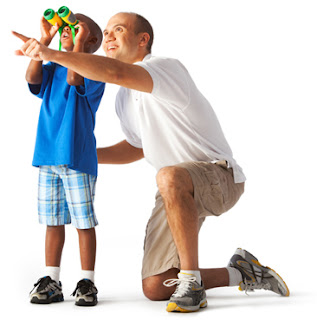 |
| being 'with' your children; not above or below them |
Raising an emotionally expressive
child is one of the biggest challenges of parenting. Most of us sadly weren’t allowed to really
express our feelings while we were children. A baby who can express her needs
becomes a child who can express her feelings. This is why we emphasize the
importance of being responsive to your baby's emotional cues. Everything we (as
well as what as children do) is laden with emotions. Have u noticed:
- Your one-month-old cries to express a need for food and holding?
- You pick up on these cues and respond to your child sensitively?
- Baby learns that these impulses within themselves have meaning?
- The child’s cries always bring comforting responses to the child?
‘Attachment’ is not about cuddling your
child and keeping him with you secure and shielded from the outside world.
Attachment parenting implies awareness of your child’s needs and bonding at a
deeper level to get a mutual understanding of each other’s expectations. You
need to know what is exactly happening when you respond to your child when he
or she needs something. They express in their own way and we understand what
they are saying and our child also understands this very well. Now the positive
outcomes that come of this:
- Expressing their needs makes children communicative
- By responding to their needs, you encourage expression
- You anticipate their needs by identifying delicate signals
- Children find appropriate means to express themselves
- They don’t have to now cry to get what they really need
- Your kids now become such a pleasure to have around!
When you respond to what your children
need, you are assuring them that you are always there for them. You may not
fulfill all their needs but you will communicate and let them express
themselves in acceptable ways even if you challenge their demands later on.
Your children feel your acceptance and understanding of them and learn to
appreciate and understand you too. They ‘connect’ with you and become extremely
capable of recognizing and exhibiting deep feelings because there are people
who appreciate it!
Detachment
parenting
This is not about neglecting your child
because essentially none of us really do that. But we may still be the devilish
detached parent by not responding appropriately to our children’s needs at that
emergent moment. We worry about over pampering our children and we want to the
‘right’ thing by not being too permissive, so we choose to ‘ignore’ our child’s
whines so that he gets alright by himself. However we may be initiating a
negative cascade here:
- You leave your child to cry because it's a ‘tantrum’
- The ‘fear-of-spoiling’ the child makes you ignore
- Your child thinks there is no response to her needs
- She now stops asking you because you cannot deliver
- She learns to ‘not express’ what she really feels ever
- She is frustrated and let down but you wouldn't know
- She may now become openly (or secretly) aggressive
Your detached child may adjust to your
schedule, be well behaved, seem like an angel; but is deeply dejected and
depressed because apparently nobody cares about her. She may also be covertly
upset with you and misbehave clandestinely in your absence to express her
hidden resentment. Such children grow to become adults with psychopathology
owing to repressed emotions. And lastly of course they may be openly aggressive
because they act out their unhappiness (all arising from their feelings for
you.)
Your
children are all about YOU
Of course your children are all about you
because you are their progenitor! When they secure accolades in school or
sport, you get the credit. So if they turn out to be rebellious and defiant,
you must have done something that made it turn out that way. Your own behavior can
ensure that your little ones become toddlers and adolescents and teenagers who
are obedient and emotionally secure gems; or stubborn and emotionally
distraught teens that are hard to manage. You can shelter your child’s
emotionality by developing that attachment in them. If you establish that bond
with your child at their tender age, your children will learn to deal with
themselves responsibly and be a source of pleasure to others. Parenting is very
hard work, but the rewards are more than fulfilling; so good luck with it!

very interesting and informative read Dr.Batra
ReplyDelete